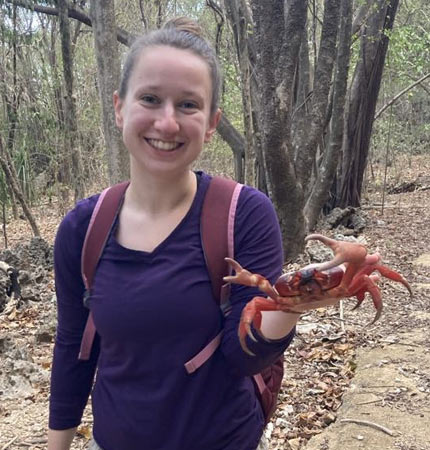Combined effects of climate change and metal exposure to physiological adaptation in early life stages of Christmas Island land crabs in wetland ecosystems
Understanding how climate change and heavy metal pollution impact the early life-stage development of Christmas Island land crabs at molecular and physiological levels.
Christmas Island, Indian Ocean is a vulnerable and unique habitat, dominated by the evolutionary expansion of land crabs, many of which act as keystone species. The reproductive biology of the crabs is heavily reliant on well-timed weather patterns, which are becoming unpredictable with a changing climate. The island also has a well-established phosphate mining industry which has left behind many open cast mining sites and phosphate piles, providing a potential source of contaminants e.g. cadmium and other metals to the wider island environment. The impact of such toxic metals on these keystone crab species has not been investigated.
This project seeks to understand the resilience of Christmas Island land crabs to climate related stressors (temperature, desiccation, salinity) during their vulnerable early life stages (embryonic through to zoeal larval stages), coupled with exposure to cadmium toxicity. Understanding complex multi-stressor conditions in light of climate change and increasing pollution pressure on crab reproduction and development will provide valuable insight into their vulnerability or resilience to future climate conditions and deepen our understanding into the mechanisms of their adaptive success at a genetic and physiological level.
Controlled, lab based experiments using a model species, and sampling and experiments using Christmas Island crabs in the field, will be used to address these aims. The repertoire of molecular work will include DNA damage, repair and metal detoxification capability, whilst physiological measurements will utilise embryophenomic imaging to identify any physiological alterations in developmental rate caused by the multi-stressor environments.
The fieldwork will focus on The Dales and Hosnies Springs sites, which are internationally recognised through the Ramsar Convention on Wetlands, and work will be supported by JNCC and Parks Australia to generate conservation policy relevant science.
Supervisors: Dr Helena Reinardy, Dr Lucy Turner (Uni Plymouth), Prof A Boxall (Uni York) and Isabella Gosetto (JNCC)
Start date: October 2025
Funder: NERC ECOWILD Centre for Doctoral Training
Turner, L.M., Clayton, K.A., Wiberg, L., Wilson, C.H., Ibbini, Z., Tills, O. and Spicer, J.I., 2025. Salinity does not affect late-stage in-egg embryonic or immediate post-hatch development in an ecologically important land crab species. Journal of Experimental Biology, 228(2), p.JEB249629.
Wilson, C.H., Wyeth, R.C., Spicer, J.I. and McGaw, I.J., 2022. Effect of animal stocking density and habitat enrichment on survival and vitality of wild green shore crabs, Carcinus maenas, maintained in the laboratory. Animals, 12(21), p.2970.
Wilson, C.H., Nancollas, S.J., Rivers, M.L., Spicer, J.I. and McGaw, I.J., 2021. Effects of handling during experimental procedures on stress indices in the green shore crab, Carcinus maenas (L). Marine and Freshwater Behaviour and Physiology, 54(2), pp.65-86.
Fieldwork experience
Research assistant on a two-week expedition to Christmas Island, Indian Ocean, 2023, organised by the University of Plymouth. I conducted ecophysiology research and sampling of land crab species during their reproductive season. I engaged with the local community and Parks Australia on research priorities, and learnt to use ‘LabEmbryoCam’ imaging technology in the field to identify embryonic developmental stages.
Qualifications
2025 BSc (Hons) Healthcare Science (Life Sciences) included within an apprenticeship standard. University of Staffordshire
2020 BSc (Hons) Marine Biology. University of Plymouth
Employment history
2020-25 Microbiology Laboratory Associate Practitioner. UK Health Security Agency
2018-19 Undergraduate Research Assistant - decapod crustacean behaviour and physiology. Memorial University of Newfoundland
